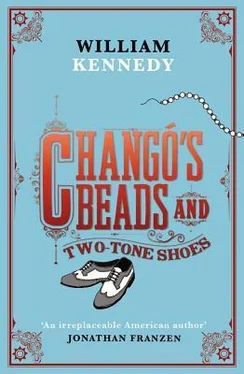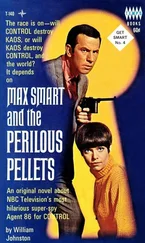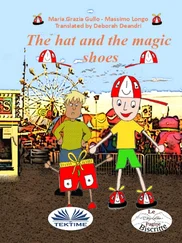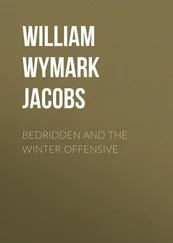That is my secret, Esme always says.
It is no secret, Renata always says.
Esme came into the room four steps ahead of Moncho. She kissed and embraced her sister, greeted Quinn with an odd gesture of elevated fingers and pursed lips, with her breasts rising from excited inbreathing, a gesture of concern.
“So, you’re alive,” Esme said. “Mother called me five times. All that shooting she thought you were dead.”
“I called her from the museum,” Renata said. “All afternoon you could not use a telephone. If you stood up you’d be shot.”
Esme looked to Quinn, and Moncho offered him a handshake. “Ramón Quevedo,” he said.
“Daniel Quinn,” said Quinn. “A pleasure to meet you. I understand you don’t live here.”
“Only historically,” Moncho said. “It is not possible to separate from Esme. No husband should be asked such a thing.”
“Husbands seem to play a peculiar role in Cuba,” Quinn said.
“Husbands are extinct,” said Moncho. “Wives are eternal.”
“I may refuse to become a Cuban husband,” Quinn said. “I’ve already proposed to Renata, but maybe I’ll postpone the wedding.”
“You proposed?” said Esme. “When?”
“This morning.”
“When did you meet?”
“Last night.”
“What took you so long?” Moncho asked.
“Daniel rescued me after the attack,” Renata said. “He found a taxi to bring us here when no one else could. He’s a reporter and Max just hired him to write for the Post. He was near the Palace all during the attack.”
“How intrepid,” Esme said, and she sat in the Peacock cane chair in front of her portrait. “You really proposed?” she said to Quinn.
“He suggested the possibility,” Renata said. “He wrote the story of the Palace attack for Max.”
“A pity they did not kill the puta, ” Moncho said.
“Be quiet or they’ll arrest you,” Esme said. “Did you see the shooting, Daniel?”
“I did, but my luck seems to be running,” Quinn said. “I didn’t get shot and I found the gorgeous Renata when the shooting stopped.”
“You can do two things at once,” said Esme.
“I do covet beauty,” Quinn said. “That portrait of you is very beautiful, and it does you justice.”
“The artist said he made me too beautiful,” Esme said.
“There is no such thing. An artist can only imitate the exquisite beauty that runs in your family.”
“Such a charmer. Please sit down, Daniel. Would you like a drink?”
“As my uncle once said, the last time I refused a drink I didn’t understand the question.”
Moncho exploded with laughter. “I understand the question and I will make you a drink,” he said, and he left the room.
“Very droll,” Esme said. And she asked Renata, “Nena, what brings you here on such a day?”
“I need a car. After today I absolutely must go away, anyplace, Cárdenas, perhaps, but I can’t take Mother’s car from her. You don’t know, Esme, you don’t know.”
“Of course I know, dear. Take the Buick. Those hateful people trying to kill the president, shooting all over the city, nobody is safe anywhere, what’s wrong with them? They’re all insane and lower class. As soon as I heard the news I tried to get a flight to New York, but they closed the airport. Americans will be afraid to come to Havana now.”
“Soldiers killed an American tourist,” Quinn said. “I was in his suite at the Regis Hotel when they shot him.”
“You weren’t.”
“An armored truck and a foot soldier both fired at us. I saved another man by pulling him to the floor when the shooting started.”
“You saved someone? You are a clever person. What are you doing in Cuba?”
“I’m trying to figure that out. My grandfather wrote a book about the Mambí revolution and he put Cuba into my head. Now you’ve got another revolution going and it pulled me in.”
“Did you come to write about Castro?” Renata asked.
“He’s a good subject, don’t you think?”
“Batista says Castro is dead or gone away,” Esme said. “Batista should know.”
“Of course,” Renata said. “Batista knows everything.”
“He knows nothing, he knows less than nothing,” Moncho said, reentering the room. Oliva, a housemaid, followed him in, wheeling a serving cart with a bottle of white rum, a bucket brimming with ice, a bowl of powdered sugar, a plate of cut limes, four cocktail glasses and a silver shaker. When Oliva left the room, Esme said, “If the servants repeat what you say you’ll be shot.”
“She is right,” Renata said.
“Of course she’s right. Tell the truth they shoot you.” Moncho squeezed the limes. “Batista’s planes bomb the Sierra and kill guajiros but they find no rebel corpses. Fidel is not gone.”
“Where is he?” Quinn asked.
“In the Sierra.”
“How do you get to see him?”
“By invitation,” Moncho said. “Without invitation they will shoot you as a spy.”
“How do you get an invitation?”
“No one knows.”
Moncho poured a cascade of rum into the shaker, added sugar and the lime juice. “I was in law school at the University with Fidel. He was a wild schemer with the political gangs, never went to class. But he learned something. He’s outthinking Batista’s army.”
“We will change the subject , Moncho,” Esme said. “Daniel’s grandfather wrote a book about Cuba.”
“Ah,” said Moncho, shaking the shaker.
“He came looking for Céspedes, the revolutionary, and he found him.”
“Céspedes!” Moncho said. “In 1948 I went to Manzanillo with Fidel to get the Demajagua bell, the one Céspedes rang to start the revolution. Like your Liberty Bell, Señor Quinn, a three-hundred-pound symbol of our rebellion.”
“I know the bell,” Quinn said.
Moncho poured daiquiris from the shaker and passed them around.
“We brought it to Havana to confront Grau, the president,” he said, “but the police stole it from us. Fidel made a speech at the University about the bell and about Grau betraying the revolution he promised the people, and thousands came. He repeated Céspedes’ words the day he rang the bell to summon his slaves — Céspedes called them citizens and said they had been his slaves until today but now you are as free as I am. He was launching the revolution and said the slaves could join him in the fight or go wherever they wanted, but all were free. Fidel knew how to use these words. He was very powerful. He lit a fire in their minds.”
“They will put us all in jail if you don’t shut up,” Esme said.
Moncho raised his daiquiri glass.
“I drink to Fidel.”
“You will be a prisoner,” Esme said.
Quinn drank and Renata crossed the room and turned on the radio to a news broadcast. The Palace was circled with tanks and a newsman was saying that scores were dead and Batista had survived the attack on the third floor of the Palace with his wife, their ten-year-old son, forty soldiers, and an army colonel with a Tommy gun. The president rode out the attack with a pistol in one hand and a telephone in the other. The attackers never reached the third floor. The camera showed shooting, then the corpses piled in the street and the park. Corpses, corpses. Renata tried to hide her weeping. Batista praised his courageous soldiers and blamed Prío for the attack. Not Castro? asked a newsman. No, said the president, Castro is nothing, of no significance.
The bell on the entrance gates rang. Oliva came into the room and whispered to Esme, who then went to the door. She came back to say that the police were asking about a car abandoned nearby. “They want to know if anyone here has seen strangers coming or going.”
Читать дальше












